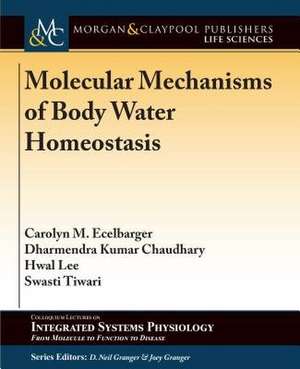Molecular Mechanisms of Body Water Homeostasis
Autor Carolyn M. Ecelbarger, Dharmendra Kumar Chaudhary, Hwal Leeen Limba Engleză Paperback
Preț: 265.57 lei
Preț vechi: 279.54 lei
-5% Nou
Puncte Express: 398
Preț estimativ în valută:
50.82€ • 52.50$ • 42.30£
50.82€ • 52.50$ • 42.30£
Carte tipărită la comandă
Livrare economică 26 martie-09 aprilie
Preluare comenzi: 021 569.72.76
Specificații
ISBN-13: 9781615047321
ISBN-10: 1615047328
Pagini: 110
Dimensiuni: 191 x 235 x 6 mm
Greutate: 0.2 kg
ISBN-10: 1615047328
Pagini: 110
Dimensiuni: 191 x 235 x 6 mm
Greutate: 0.2 kg
Notă biografică
Department of Medicine, Division of Endocrinology and Metabolism, Georgetown University, Washington, DC 20007
